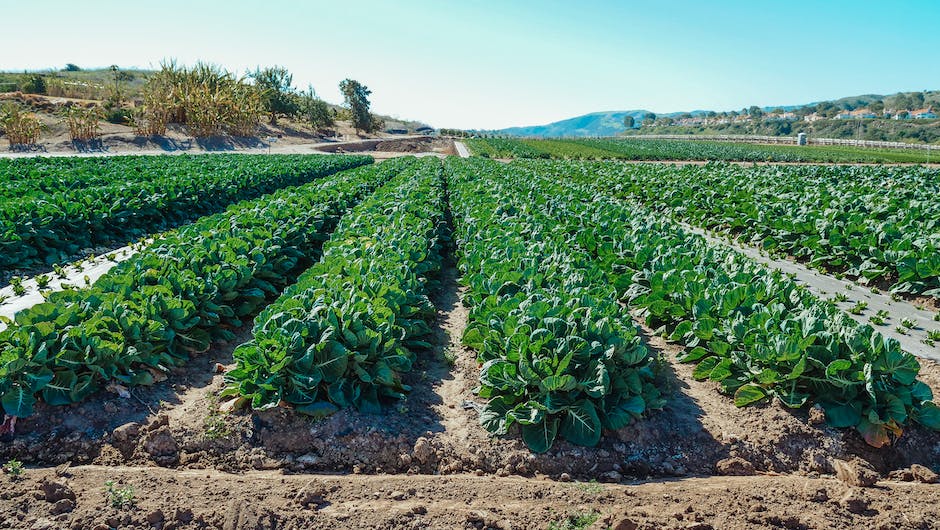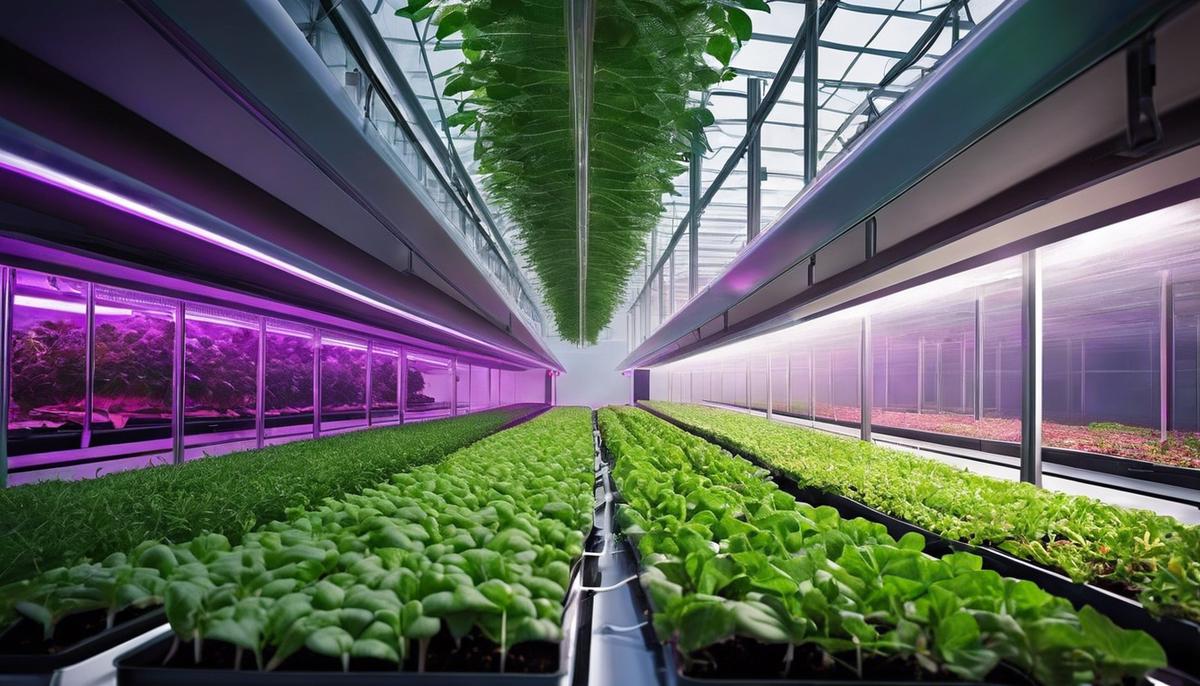

Agridisk
Egypt - Alexandria

Profitable agribusiness, definition, how to start for beginners? & Which agriculture business is most profitable?
Description: Agribusiness, a fusion of agriculture and business, carries significant potential for profitability in a world increasingly conscious of sustainable food production. As we stand on the threshold of breakthroughs in farming technology and societal shifts towards organic and locally-produced food, the stage is set for enterprising individuals willing to delve into profitable agribusiness. The aim of this discussion is to unpack the intricacies of this sector, from understanding what profitable agribusiness entails, to identifying opportunities, laying the groundwork for a successful enterprise, and implementing strategies for long-term profitability. This comprehensive guide delivers the tools and know-how for both novice and seasoned entrepreneurs to navigate the profitable agribusiness landscape. Agribusiness! A term that resonates profit, growth potential, and industry dominance, especially in today's economic landscape. It goes beyond traditional farming; it is about leading-edge technology, savvy business models and visionary sustainability practices. Understanding the profitable agribusiness model and its significance today is akin to dissecting the current and future shape of global economy. At its base, a profitable agribusiness thrives on marrying agricultural activities with the latest technology and strong leadership. It is not limited to farming or food production; it spans a range of industries – biotechnology, equipment manufacturing, food processing, and pharmaceuticals to name a few. Essentially, it is a socio-economic trove of opportunities. The potential for profit within this industry depends on innovative, even audacious business strategies. Increasing yield for higher profits used to be the goal. Today's agribusiness leaders know better: It’s about maximizing efficiency and sustainability, leveraging technological advancements from AI to drones, and reducing waste while amplifying output. It’s about reinventing processes while disrupting the norm. But why has profitable agribusiness become so pivotal in today's context? Because it follows a key economic tenet: necessity. No matter the economic climate, people need to eat. Demand for food remains consistent, which in turn, guarantees consistency for agribusinesses. Moreover, as the global population continues to expand, the demand for food is not only consistent, it's escalating. With an estimated 9.7 billion mouths to feed by 2050, this expansion mandates a business that works smarter, faster, and more efficiently. This is where profitable agribusiness skills thrive. Let’s add another layer here: the sustainability aspect. With climate change concerns and our environment at risk, agribusiness is on the front lines. Hence, including sustainable practices in the business model invites investor interest, enhances reputation, and ensures long-term success and profitability. It's not merely about doing good, but about good business sense. Furthermore, the Covid-19 pandemic underscored the significance of having a solid agribusiness infrastructure in place for any nation. Having control of food supply chain became a matter of survival amidst lockdowns. Strong agribusiness models proved their resilience and profitability even while other sectors collapsed. To sum, the profitable agribusiness model is a staple in today’s business landscape, and its importance continues to burgeon. It combines the certainty of consistent needs, the ingenuity of technological advancements, and the necessity of sustainable practices. It is a beacon showing the way to a profitable, sustainable, and resilient future. And yet, it is an industry that is only just beginning to unfurl its full potential. Expanding on the exhaustive coverage of agribusiness' definition, scope, relevance of innovation, impending demand, sustainability, pandemic effects, and future prospects, let's delve deeper into identifying the most lucrative areas in this sector. A sound understanding of current and emerging market trends is imperative in pinpointing profitable avenues within agribusiness. The global lifestyle shift towards organic and sustainable diets opens up opportunities for businesses specializing in organic farming and livestock production. The organic sector has registered robust growth, showing tremendous potential for those willing to capitalize on this shift. Additionally, advances in biotechnology are dramatically changing the agribusiness landscape. High-end solutions such as Genetically Modified Organisms (GMOs) and bio-fertilizers aim to increase yield and manage crop diseases organically. Forward-thinking businesses venturing into this field can reap substantial rewards. Another profitable facet of agribusiness is the burgeoning demand for farm technology. The adoption of AI-based precision farming, use of drones for crop surveillance and monitoring, and deployment of data analysis for optimized farm management underline the future of farming. Businesses that can provide such innovative solutions will command this sector's profits. Considering the ride of e-commerce in agribusiness, opportunities are rife for businesses operating in online grocery retail. As consumers pivot towards online shopping for convenience and safety, Penetration of faster delivery frameworks and advanced inventory management solutions can give businesses a competitive edge in this profitable domain. Furthermore, agribusinesses should not neglect the potential in waste management and recycling. Value can be extracted from agricultural waste through various processes like composting, biogas production, and construction materials. Businesses able to innovate and deliver solutions in this realm hold promising profitability. Equally important is the role of financing in agribusiness' growth. Companies focusing on meeting farmers' financing needs can unlock substantial profits. Initiatives like microfinancing for small-scale farmers and innovative financial products tailored to the agricultural cycle can set businesses apart in this sector. In conclusion, entrepreneurs willing to invest in market research, adapt their business models to emerging trends, and innovate in niches such as organic production, biotechnology, farm technology, e-commerce, waste management, and agri-finance can chart their course to lucrative success within this ever-growing sector. Trend analysis, innovation, and adaptation stand as three pillars of opportunity identification within agribusiness. Venturing into Agribusiness: A Step-by-Step Strategy for Beginners The agribusiness scope transcends beyond mere farming practices. It's a conglomerate of diverse industries, established under a singular goal - to cater to the constant and ever-growing demand for food. With such a massive demand, it offers vibrant avenues for entrepreneurs who are itching to dive into its depths and innovate. Let's delve into some of the key steps that can aid beginners in launching and scaling their agribusiness venture. The first step towards a profitable agribusiness is having a profound understanding of the market ecosystem. This includes the crop demand and supply patterns, consumption behaviors, regional and seasonal variability, and changing food trends. This terrain requires extensive market research. It's about exploring imperfections, seeking opportunities, and hence, finding the perfect market fit that converts opportunities into profitable products or services. Write a comprehensive business plan. Include details about your target market, business structure, product or service line, marketing and sales strategy, and financial projections. This process will define your roadmap, help to actualize thoughts, validate the feasibility, and give a clear picture of your agribusiness plan. Agribusiness operates on tangible resources. Identify your requirements based on your business plan. Resource acquisition should factor in land, machinery, labor, and logistics. It's key to strategize and implement tactics to optimize resource utilization for maximizing operational efficiency and profit margins. Ensure compliance with all local, state, and federal codes and laws. This encompasses land use permissions, safety regulations, environmental laws, and obtaining relevant licenses. Adherence to these legal requirements is pivotal to avoid any future hassles or legal implications, which can affect business operations and reputation. A robust supply chain is pivotal to the success of an agribusiness venture. It plays an integral role in maintaining product quality through optimized transport and storage facilities. Investment in technologies, such as Big Data and Artificial Intelligence (AI), can provide valuable insights for decision-making and enable efficient supply chain management. Embrace innovative technological advancements, like AI-driven precision farming, drone technology, and IoT. Such innovations will ramp up production, reduce resource wastage, and lead to considerable cost savings. Opt for online retail and e-commerce platforms to capture the benefits of digital growth and global presence. Finally, in the quest for high profitability, don't undermine the need for adequate financing. Develop a financial contingency plan and utilize the multiple financing solutions available for farmers. This plan should also take into account the temporary disruptions or uncertainties like the recent Covid-19 pandemic. From a broad perspective, launching a successful agribusiness is characterized by refining every procedure within your agribusiness model, right from production to consumption. It is this constant pursuit of growth, intermingled with innovation, efficiency, sustainability, and adaptability, that assures a lucrative venture in agribusiness. Here's to prolific growth, and innovation powered by technology, sustainability, and efficiency! To remain competitive and profitable in the ever-evolving sphere of agribusiness, players must not only be agile but also innovative and perceptive of market trends. The role of technology, the adoption of sustainable practices, risk management, market expansion, and forging strategic partnerships cannot be underestimated in the journey to establishing a sustainable agribusiness. The balance between profitability and sustainability is the key to long-term success in agribusiness, keeping in mind that a thriving enterprise hinges on more than immediate gains. The world needs sustainable, efficient, and profitable farming practices more than ever, and with the right knowledge and tools, agribusiness could be your gateway to achieving both financial success and a sustainable future. As we delve into the ever-evolving landscape of agriculture, it becomes increasingly clear that certain sectors within this vast field are burgeoning with potential for profitability and sustainability. The horizon of agrarian enterprise has expanded beyond traditional methods to embrace practices that not only promise greater financial returns but also resonate with the collective consciousness of an eco-aware society. From the cultivation of boutique organic crops catered to the sensibilities of clean eating enthusiasts to the technological triumphs of Controlled Environment Agriculture, our exploration will unveil the rich tapestry of opportunities that beckon the entrepreneurially minded to sow seeds of innovation and reap a bountiful harvest in the modern age. In the ever-evolving landscape of business and agriculture, astute entrepreneurs understand that responding to consumer demands for healthier, sustainably grown food is not just good practice—it’s good business. Cultivating niche organic crops isn't merely a trend; it's a potent strategy to carve out a profitable corner in the market. Here’s why diving into this green endeavor can reap financial rewards that are anything but garden variety: Consumers today are more health-conscious and environmentally aware than ever, willing to pay a premium for products that promise purity and sustainability. Organic crops, grown without synthetic pesticides and fertilizers, cater to this burgeoning segment, allowing sellers to command higher prices. In a market saturated with mass-produced commodities, rarity is a currency. Specialty organic crops that are hard to find become culinary treasures sought after by high-end restaurants and food enthusiasts. These products can be sold at a considerable mark-up, reflecting their scarcity and unique value proposition. By focusing on niche organic crops, a brand sets itself apart in a crowded marketplace. It isn't just selling a product; it's offering a narrative about healthiness, quality, and individuality. This resonates with consumers and can build fierce brand loyalty that pays dividends long-term. Specialization in niche crops means fewer direct competitors and potentially more control over the supply chain. By mastering the intricacies of growing specific organic crops, businesses can refine their production processes and gain leverage in negotiations with buyers who have limited alternatives. With niche crops, quantity is traded for quality, which, in the mantra of discerning consumers, is worth its weight in gold. By focusing on superior products rather than volume, businesses sustain high-quality standards, minimizing waste and cultivating a reputation for excellence. Often, governments and environmental organizations offer incentives for sustainable farming practices. Engaging in the cultivation of niche organic crops can make businesses eligible for grants, tax breaks, and other financial incentives, thus boosting margins through policy support. Niche crops allow for highly targeted marketing efforts. Understanding the demographics that favor organic produce provides incredible insight for crafting compelling marketing narratives, engaging directly with specific consumer groups, and optimizing marketing spend for the highest return. As trendsetters in a specialized market, businesses can become thought leaders in organic agriculture. This positions them not just as purveyors of goods, but as innovative figures at the forefront of the organic movement, attracting partnerships, investment, and growth opportunities. For the discerning entrepreneur, cultivating niche organic crops presents a fertile ground for growth. It's a smart blend of catering to ethical consumption patterns, leveraging exclusivity, and asserting market leadership. In doing so, one doesn't just grow crops; they cultivate a robust, resilient business model primed for flourishing profits amid the green revolution. So, the question isn't whether to embrace niche organic crops, but rather how quickly can one sow the seeds of business innovation and harvest the financial rewards. Enhanced Production Efficiency: Controlled Environment Agriculture (CEA) enables agripreneurs to achieve higher yields with fewer resources. Advanced systems control factors like lighting, temperature, and humidity, creating optimal growing conditions year-round. This efficiency drives higher output per square foot compared to traditional farming. Scalability Flexibility: Agripreneurs can scale operations vertically or horizontally, adjusting to market demands swiftly. The modular nature of many CEA setups makes phased growth possible without the barriers of purchasing additional farmland. This an appealing proposition for investors seeking to maximize space and efficiency in urban areas. Technological Integration: CEA is at the forefront of agricultural tech, incorporating IoT devices, AI, and data analytics to enhance decision-making and crop management. These technologies offer real-time insights for precision farming, reducing waste and increasing crop consistency. Tech-savvy investors recognize the value of data-driven agriculture, making CEA an apt investment. Reduced Risk Profile: Traditional agriculture is susceptible to unpredictable weather patterns and pests, but CEA operations can significantly mitigate these risks. By controlling the growing environment, agripreneurs lessen crop loss from such externalities, providing a more stable investment. Resource Conservation: Water scarcity and soil degradation are critical global issues. CEA utilizes recirculating systems and hydroponics, drastically cutting water usage and eliminating soil-based growing. Investors attracted to businesses that make a positive environmental impact will find CEA aligns with their values, combining conservation with capital gains. Consumer Health Awareness: Today's consumers demand fresh, pesticide-free produce. CEA's controlled settings can eliminate the need for harmful chemicals, resulting in cleaner, healthier food products. Agripreneurs capitalizing on this health trend can command a thriving consumer base willing to invest in their well-being. Adaptability to Future Crops: As dietary trends evolve, CEA infrastructures can relatively easily transition to alternative crops to meet new consumer demands. This adaptability makes it a forward-thinking choice for investors who value agility and future-proofing their portfolios. In conclusion, Controlled Environment Agriculture presents a compelling case for modern agripreneurs, touching upon the core principles of efficiency, scalability, technological advancement, risk management, sustainability, consumer health, and adaptability. Its inherent advantages seamlessly align with both the financial objectives of investors and the emerging trends of conscientious consumption, solidifying its place as a powerhouse in the future of farming. Global Food Security Challenges Given the skyrocketing global population and shrinking arable land, agri-tech is the Achilles' heel that turns the tide from potential global food shortages to security. Investors recognize that innovations addressing food production constraints are not just profitable but essential. Venture Capital Magnetism Smart money knows an emerging sector when it sees one. Agri-tech's fusion of technology and agriculture is a darling of venture capital. Investments in agri-tech startups are accelerating, confirming the market's confidence in the sector's growth trajectory. Legislative Support Waves Governments worldwide are waking up to the necessity of sustainable agriculture. Legislative support, in terms of subsidies and favorable policies, often follows suit, paving the way for agri-tech companies to thrive with reduced regulatory friction. Data-Driven Agriculture A data revolution is underway in the fields. Precision agriculture leverages big data analytics to deliver unprecedented insights into crop management. Investors eyeing technologies that enable smarter decisions recognize agri-tech's massive potential for profitability and expansion. Climate Change Mitigation Climatic uncertainty calls for agriculture that can withstand extremities. Agri-tech innovations focused on climate resilience are not just an investment in the sector but in the future of a stable planet. They address an evergreen need that knows no economic cycles. Next-Gen Biotech Breakthroughs The crossover between biotech and agri-tech, including CRISPR and GMO advancements, presents a new frontier for enhancing crop yields and quality. Forward-thinkers in the investment arena are quick to spot these intersections as hotbeds for potential exponential returns. AI and Robotics in Agriculture Robots don't just assemble cars; they are starting to pick fruit and sow seeds. Artificial Intelligence and robotics in agri-tech are streamlining labor-intensive processes, presenting investors with a dual opportunity—cutting costs and optimizing operations in one fell swoop. Cross-Industry Collaboration Agri-tech does not sit in isolation. It forms symbiotic relationships with other technologies and industries, leading to synergistic growth opportunities. From logistics to fintech, savvy investors know that agri-tech's tentacles spread wide, offering diversified benefits and mitigated risk. Revolutionizing Traditional Models Agri-tech innovations disrupt traditional farming models, displacing outdated practices with efficient, modern solutions. Investors who capitalize on these paradigm shifts tend to secure their spot at the forefront of a lucrative revolution. Market Responsiveness to Health Trends As the appetite for healthier, organic, and locally sourced food grows, agri-tech stands at the ready to serve this burgeoning demand. The quick adaptation of agri-tech solutions to health trends underlines their potential for sustained growth and investment attractiveness. In conclusion, agri-tech innovations comprise a goldmine for those with the acumen to recognize the converging forces of need, opportunity, and timing. With an unflinching gaze on the horizon, savvy investors take note: agri-tech is not just a trend but a transformative force reshaping the contours of investment portfolios and the future of food production. In an era where the consumer is king, sustainable livestock farming secures a powerful position by fostering community engagement and earning social license. By aligning with local values and being proactive about environmental and animal welfare concerns, farmers create community advocates instead of adversaries. Garnered support translates into a resilient market position, solidifying longevity and profitability. Businesses that thrive tend to be those with robust community ties and social approval, which sustainable farming inherently cultivates. Regulatory environments are increasingly stringent on environmental standards. Sustainable livestock farming, however, by its very nature, is a step ahead of compliance. Producers who adopt these practices early avoid the rising costs of catching up to new legislative requirements and evade potential penalties for non-compliance. These savings can be funneled back into the business or passed on to consumers, sharpening the competitive edge. Sustainable farming is not just about producing; it's about contributing to a greener planet. Farmers who employ sustainable practices can often earn carbon credits through government programs or independent carbon markets. These credits, which are tradable, represent a new income stream while simultaneously showcasing commitment to combating climate change. Building trust in today's market is gold. Producers who can verify their ethical and sustainable practices with certifications tap into a growing consumer base that values transparency. This deepened trust not only fosters brand loyalty but can also catapult brand ambassadors, leading to organic growth that every business craves. Diversifying species and genetic resources within sustainable livestock operations minimizes the risk of disease outbreaks and protects against market fluctuations. A biodiverse system is nature's way of providing insurance; it creates a more resilient agricultural ecosystem that can withstand shocks, ensuring stable and continuous production. An unheralded advantage of sustainable livestock farming is the potential for energy production. Through techniques like anaerobic digestion, farms can convert waste into energy, achieving independence from external energy sources. This element adds another layer to the appeal of sustainable practices, contributing to a self-sufficient and financially robust operation. In sustainable systems, byproducts are not simply waste; they are opportunities for additional revenue. By cycling waste back into the production system—for instance, as fertilizer or feed—farmers close the loop, reduce external input costs, and minimize environmental impact. This integral practice showcases an innovative and resourceful approach that garners respect from industry peers and eco-conscious consumers alike. By carving a path that harmonizes profitability with responsibility, sustainable livestock farming embodies the intersection of ecological stewardship and shrewd entrepreneurship. It’s not just about meeting today’s market demand but innovating for the demand of tomorrow, ensuring a thriving agricultural sector for generations to come. Embarking on a journey through the verdant fields of profitable agriculture ventures, we've unearthed the burgeoning promise of precision farming and the allure of niche markets eager for the fruits of eco-friendly labor. The synthesis of traditional wisdom with cutting-edge innovation has birthed a new era in the agrarian world, where ethical husbandry practices and advanced agri-tech coalesce to create lucrative endeavors that sustain not only the ambitious hearts of farmers but also the planet that nourishes us all. As we strive to feed a growing global populace, the harmonious blend of profit and planet-minded practices shines as the guiding star for the future of agriculture business.Profitable agribusiness, definition, how to start for beginners?
Understanding Profitable Agribusiness
The Profitable Agribusiness: An Unstoppable Powerhouse in Today's Economy

Identifying Profitable Agribusiness Opportunities

Starting a Profitable Agribusiness
Understanding Your Market
Business Planning
Land and Resources Acquisition
Legal Requirements and Licenses
Effective Supply Chain Management
Adoption of Innovative Technologies
Adequate Financing

Staying Profitable in Agribusiness
Which agriculture business is most profitable?
Boutique Organic Crops
Premium Pricing Power:
Exclusivity Equals Opportunity:
Brand Differentiation:
Supply Chain Command:
Lower Volume, Higher Quality:
Sustainability Incentives:
Targeted Marketing:
Innovation Leadership:

Controlled Environment Agriculture (CEA)

Agri-Tech Innovations

Sustainable Livestock Farming
Community Engagement and Social License
Compliance Cost Reduction
Carbon Credit Revenue
Deepened Consumer Trust
Risk Management by Biodiversity
Energy Independence
Closing the Loop: Waste as Resource
